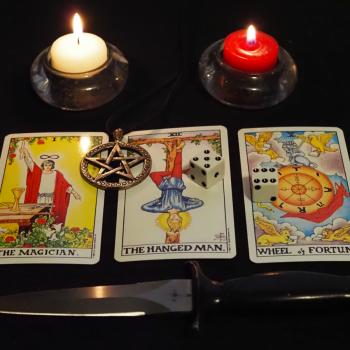 The wish-fulfilling tree is a mythical flowering shrub, which in Hindu mythology is said to grow in heaven. When you sit underneath it, the story goes, it blesses you so that all your wishes come true. I like to read that story as a metaphor. The wish-fulfilling tree is consciousness itself. In other words, your own mind is a wish-fulfilling tree, which can bestow blessings on ourselves and, especially, on others.
The wish-fulfilling tree is a mythical flowering shrub, which in Hindu mythology is said to grow in heaven. When you sit underneath it, the story goes, it blesses you so that all your wishes come true. I like to read that story as a metaphor. The wish-fulfilling tree is consciousness itself. In other words, your own mind is a wish-fulfilling tree, which can bestow blessings on ourselves and, especially, on others.
Like many people who do spiritual practice, I 'knew' about the power we have to bless others long before it occurred to me to act on it. The switch—call it a paradigm shift—happened one afternoon when I was sitting in an outdoor café in Cambridge, Massachusetts. A homeless man had staked out a spot on the sidewalk, from which he was cheerleading the passers-by. When a woman walked past he would say, "Ah, pretty woman!" When a man walked by he'd say, "Strong man!" He said these words mostly to the older people, the plain-looking women, the slightly geeky guys. Moreover, he spoke with such sweetness and conviction that his words seemed to carry a real benediction. For an hour, I watched him, seeing how people reacted with little amused, pleased smiles (and, of course, the occasional five-dollar bill). Maybe it was a scam, a new twist on panhandling. But the effect on the people who passed him was palpably uplifting. You felt, literally, blessed by his regard.
Watching this man was a lesson for me in how one person's blessing can completely shift the atmosphere around him. It's something I've been working with ever since. When there's nothing else you can do for someone, when your job or your relationship blows up in your face, or the world seems headed for destruction and you feel powerless to stop it, you can at least offer a blessing. On an immediate level, offering blessings helps us feel that we're doing something. But there's a deeper aspect to it. When we offer blessings, we align ourselves with the force of grace that runs through the universe. We become channels for the higher power. And according to some of the mystical traditions, this is the hidden purpose of human life.
The Vedic sages, whose culture is the basis of the Hindu tradition, believed that one special function of human beings is to create conscious bridges between earth and cosmos. They did this through invocations and offerings, and bracketed their practices and ceremonies with mantras we chant to this day—Lokaha samastah sukhino bhavantu—May all beings be happy.
Let me say here that there's a big difference between an intentional blessing, and the conventional, pro-forma blessing that we might pronounce out of social habit. A friend of mine grew up in a family where the women started every other sentence with "Bless your heart!" She says that when her mother and aunts said, "Bless your heart," it was usually the prelude to some particularly trenchant criticism—as in "Bless her heart, Luanne is still drinking too much," or "Bless your heart, you're the messiest child!" As a result, she developed a knee-jerk suspicion of anyone who offered blessing.
Few of us are that obviously passive-aggressive with our blessings, but many of us spent years tuning out the half-hearted or automatic blessing invoked at family dinners or even at church. So when we begin to offer blessing as a serious spiritual practice, we may have to get past a kind of malaise about it. Do blessings do any good? Is giving a blessing a way of convincing yourself that you're 'helping' when you can't or won't do something concrete? Is giving blessings basically a way of kindling positive mind states in ourselves, as loving-kindness practice is often presented as an antidote for our own negativity?
The answer to all these questions is the same: it depends on the energy and intention behind the blessing.
Who Gets to Give Blessings?
In most traditional cultures, including our own, certain people were 'authorized' to give blessings, usually because of their accumulated wisdom, practice, or life experience. Kings and priests supposedly had it by birth or ordination, though they had to uphold their right to bless by their righteous actions. Parents and grandparents had earned it through life experience and service. Spiritual practitioners accumulated power through their intense practice. Because these people had earned their power through their practice or life choices, their blessings had a kind of mojo—an ability to empower your life, remove difficulties, or connect you to the transmission of a particular spiritual lineage.
Blessings Are Democratic
The idea that 'regular' people can give effective blessings is relatively modern, a sign of the growing democratization of spiritual culture, the stripping away of traditional hierarchical beliefs about what constitutes spiritual authority. Though this trend has its down side—how many half-baked yogis and shamans have been loosed into the culture in just the last thirty years?—it also speaks to a couple of important truths.





